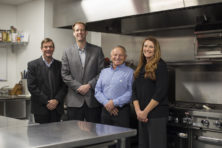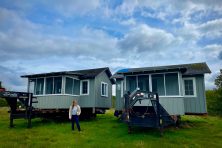A Summer Place
- Share
- Tweet
- Pin
- Share
To his amazement, the lawnmower started, not on the first pull, but eventually, after many persistent tugs. After becoming warm from the exertion he had removed his jacket and his muttered expletives had gradually gotten louder; he tried not to curse any more, one of the many vices he had attempted to shed, like a snake wriggling free from an old skin. Finally, the old motor began to sputter, as if grumbling Leave me alone, dammit! And then, at last, Okay, okay, I’ll mow the goddamned lawn.
Nate would not have bothered if this had been a weekend visit to the summer place, the small house and lawn that had belonged to his grandmother. His father had inherited the property, and now it had come to Nate. The sins of the father visited upon the son.
Loon Lake was a short walk down a gravel lane from the house. Nate had hazy memories of the man he had called Gramp, the old guy who spent hours sitting in a rowboat out in the lake waiting for fish to bite. As a boy, Nate had considered Gramp a marvel of determination, exhibiting willpower that only adults could achieve. Nate couldn’t stick to anything very long before he lost interest, but Gramp would be out on the lake first thing in the morning and not come back until almost lunch, sometimes with a few fish, but just as content if he returned empty handed.
Not until he was a man did Nate realize that for Gramp, the lake was not a destination but an escape hatch. The boat was his castle, the surrounding water his moat, and he was secure from the demands of family, the expectations of polite conversation, the requests for favors, the assignment of chores, the quotidian tedium that settled over his shoulders like the cobwebs that festooned the walls and ceiling of the garage where the lawnmower had rested undisturbed until Nate had intervened.
Granny, on the other hand, thrived on company. She began baking in anticipation of a visit from the family, and continued to cook during their stay, serving a full breakfast, a hardy lunch, a mid-afternoon snack, a lavish supper, and then a light lunch before bedtime to tide everyone over until morning. The food seemed magical in its abundance, as if spilling forth from a cornucopia rubbed by a genie. And Granny urged everyone to eat, as if famine were imminent.
Maybe the kitchen was her rowboat.
She and Gramp were a Jack Spratt could eat no fat and wife could eat no lean couple, he weighing no more than 140 in his shoes and soaking wet; she, making certain that she never had occasion to step on a scale, perhaps out of concern that she would do it irreparable damage. She laughed easily; he found fault.
One morning he didn’t come in to lunch. She waited until almost one o’clock before she went looking for him, knowing he’d sputter and curse at her impatient foolishness if she pestered him. At the end of the lane, she stood on the wooden pier with her hands at her waist staring off across the water of Loon Lake. From that vantage point she could see its circumference, and it wasn’t until after a thorough investigation, half-expecting to see the rowboat floating untethered, that she realized it had been tied up to the pier, half hidden underneath it.
She hadn’t heard the car start up, and was pretty sure that it had been in the driveway when she left the house, but, as Gramp liked to remind her, she’d forget her ass if it wasn’t fastened on.
Before she had walked all the way back to the house, she could see the car in the drive, and her breathing became labored, not from the unaccustomed exercise of walking along the road, but from a sense of foreboding that settled over her like the fog that often hovered on fall mornings.
She found him in the garage.
Nate had never cared much for his grandfather. The lawnmower seemed to be his reincarnation, content to spend eternity in the garage. Grumbling and smoking, the engine continually killed in the tall grass, even when set at the maximum height and pushed forward at a snail’s pace, a nudge ahead and a step back, like taking Granny for a walk. As the work was slow progress Nate began to wish he had left the lawn au natural, but once he had committed himself, he felt he should finish the task. A partially mown lawn conjured images of an abandoned car parked on the front lawn, a soggy sofa on the front porch, and garbage cans hidden under a pile of trash.
As he had nothing better to do, he stopped the engine to let it cool, pulled off his shirt to let his sweat dry, and walked into the kitchen to get a drink of water. He caught a glimpse of himself in the hall mirror as he stepped into the entryway, half startled, as he wasn’t accustomed to his new look. Rather than a well-groomed man with slicked-back dark hair and a tailored suit, he saw a red-faced guy with stubble on his head and face. In the past he had colored his hair to conceal the gray but now to simplify his life, had shaved his head to start fresh. And he had chosen to stop shaving his face each morning. He looked as if he were in a witness protection program, and the thought amused him.
For in some respects, he was. He had left his suits behind him, along with his wingtips and the nameplate on his desk, Nathaniel Johnson. Simplify, simplify, simplify.
The wooden cupboards were painted a mint green. After Granny had died, his mother had insisted that they be painted white. But once the place had become officially Nate’s, he repainted them the original mint green. When the children were young, he and Laura had made the drive from the city to the summer place nearly every weekend, a journey that took them not only to a different geographical location, but to an earlier time, old-fashioned kitchen with vintage appliances, iron bed frames and quilts, linoleum on floors and yellowing lace curtains on windows.
Nate knew he should put on his shirt while he mowed the lawn, especially as he had no sunblock. After his first bout with skin cancer, he had been careful, keeping himself protected, but he knew irreparable sun damage had been done to his skin years ago. Now it really didn’t matter. Life was like that in so many ways. You can’t go home again, Thomas Wolfe. If you can’t be with the one you love, then love the one you’re with.
He found a rake in the garage, not a leaf rake but a garden rake, hardly the right tool for the right job, but Nate had become the master of making do. He raked the grass into a pile, and carried armfuls to the corner of the lot where Granny had maintained a small kitchen garden. After she had passed away, it had gone fallow. No one spent enough time there to tend a garden. At first, they had tried, making a big deal of planting it, but the plot was a failure, foiled by weeds, drought, and foraging critters.
But the plumes of asparagus and the seed heads of rhubarb persisted. And the blackberries, too, were in for the long haul, an old half-wild variety with thorny canes that would attach themselves to skin and draw blood.
Maybe he could rent a tiller from the hardware store, Nate thought. It was best to plant a garden in spring, but the idea of a garden was more important to him than any produce he might harvest. He needed to see something grow. Like Willie Lohman.
The grass clippings made his skin itch, even after he had brushed away the bits that clung to the hair on his chest and belly. The grass looked like something removed from a cow’s first stomach. And in a perverse way, the itch felt good, just as his sunburn would, hair shirts he was willingly to wear.
Granny’s rose bushes were blooming, one of the reasons that Nate wanted to mow the lawn. While a yard gone wild had charm, the old garden roses required a smooth green carpet to look their best. Uncle Howard had dug up shoots from the shrub roses at the home place when Gramp and Granny bought the cottage.
She had under-planted the roses with bleeding hearts, fox gloves, clove pinks and perennials he couldn’t identify, but most were all gone now, except for a lilac by the porch, a patch of lemon day lilies by the cellar door, and a row of hollyhocks by the garage. The shrub roses had endured, like heirlooms in a country cemetery. The air was redolent with their perfume, the scent of love: the romantic cliché of scattering rose petals on the fresh sheets of a bed to perfume them, and then lying naked on them to make love.
Nate was ostensibly on a business trip, long after his teenage children were no longer fascinated by stagnant water and his wife found the cottage inconveniences annoying: We were just at the lake, weren’t we? He couldn’t explain to them that the summer place was more than a shack; it was a way of life.
I would love to have your baby, she had whispered into his ear, and his heart had drummed at the thought, a possibility, though so many of them were now dead ends.
The summer place was a gateway to romance, not as much scattered rose petals on sheets, as an escape from the commonplace, trivial annoyances, nagging responsibilities: sitting alone in the morning mists, adrift in a rowboat; cooking in a solitary kitchen, a redolent aroma of baking cookies; planting antique roses along a vintage picket fence.
Walter had suggested that he take a six-week leave of absence to get his life together, and then come back and see how things worked out. Laura was less generous in her demands, and the kids were no longer communicating with him.
But he had brought his running shoes, his bike, and his laptop. He’d have to ride into town to make an Internet connection at the library, but he could write. Nate had in mind a novel, one with a plot that he could control, with characters that he could nudge in the right direction, with problems that dissipated in the sunlight of a new day like morning fog. And he had brought with him paperbacks of Dickens’ novels, not only to read the ones that had been assigned in school (Great Expectations, A Tale of Two Cities, Oliver Twist) but to fill the long evenings.
As soon as the sun came up he would percolate coffee on the kitchen stove like Granny used to do, and sip it as he sat at his laptop and wrote. And in the late afternoon he’d take a break with a mug of tea and read while supper cooked, and continue reading after he had eaten, until he felt sleepy and went to bed. Simplify, simplify, simplify: no clock, no television, no cellphone.
He would plant his nine rows of beans in his Inverness and watch them grow. He would march to the beat of his different drummer. He would brown in the sun, like bacon, losing fat and finding a crispness that would take him through the summer, and he’d see if he could find his way back, leaving only the mower in the garage. And he’d see how things worked out; he could always return to the summer place.
Bio: Gary Jones is a free-lance writer who lives in Sister Bay and Platteville.


